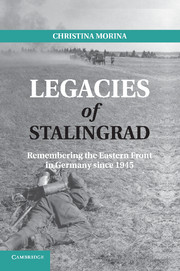4 - Peacetime Wars
Official Memory and the Integration of Individual Wartime Experiences
Published online by Cambridge University Press: 07 October 2011
Summary
Escape and escape again – only that is the future: conversion and forgetting.
From Stephan Hermlin’s Lieutenant Yorck of WartenburgFor the moment, I will leave the political sphere and focus on veteran discourse and the no less complex relationship between history and individual memory. Unlike after World War I, there was no “myth of the war experience” after 1945. The soldier did not come out of this war a hero – fighting and dying for one’s fatherland did not become a way of life in postwar Europe after 1945 as it did after 1918. To former soldiers – U.S., Soviet, and German war veterans alike – the war embodied the utmost sacrifice and suffering that a soldier could offer and endure while serving his or her country. To German intellectuals, World War II was a “non-redemptive apocalypse” in which the image of war was fundamentally changed and the monstrosity of the crimes committed marked what Hannah Arendt called a “rupture with civilization.” It is obvious that the collectively shared experience of individually endured, witnessed, and/or perpetrated extreme violence in World War II made it, compared to the aftermath of World War I, much more difficult to come to terms with these experiences. Stalingrad and the brutal warfare on the Eastern Front were the central historical reference points around which such a discourse of crimes and suffering – be it in private or in public – circled. In the immediate postwar years, official memories of the Eastern Front entailed addressing the question of guilt according to political imperatives, thus it received marginal attention in the West but strong and calculated attention in the East. Yet this divide characterized only the realm of political memory. Private memories in East and West Germany, in contrast, focused on the suffering during World War II and blended out the issue of personal responsibility. In this chapter I demonstrate, however, that these individual memories did not necessarily challenge the respective official narratives of the Eastern Front war because (and as long as) they fit well into the demands of everyday Cold War politics.
- Type
- Chapter
- Information
- Legacies of StalingradRemembering the Eastern Front in Germany since 1945, pp. 131 - 174Publisher: Cambridge University PressPrint publication year: 2011

